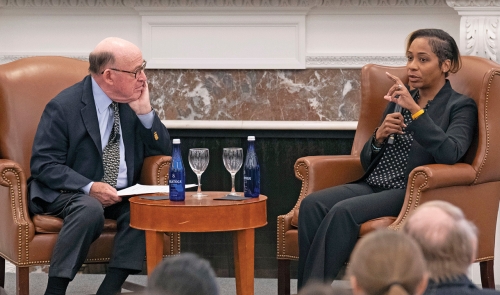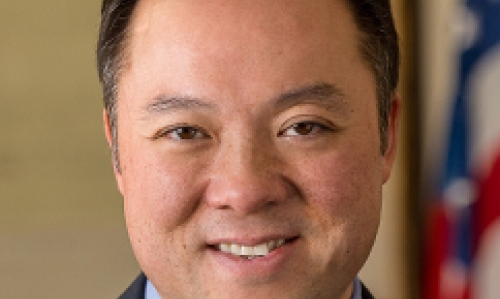In Abrams Lecture, Massachusetts AG Andrea Joy Campbell recalls unusual path to public service

Delivering the 29th annual Attorney General Robert Abrams Public Service Lecture on September 8, Andrea Joy Campbell shared colorful anecdotes, sprinkled with philosophical reflections, in retracing her unconventional journey to becoming Massachusetts attorney general.
Former New York Attorney General Robert Abrams ’63, founder of the lecture series, introduced Campbell and served as interlocutor during her remarks.
In her current position, Campbell—the fourth Black woman ever to serve as a state attorney general in the US—has addressed matters involving consumer protection, workers’ rights, the environment, and public health and safety. Asked by Abrams to name a signature achievement from her first year in office, Campbell singled out a suit that her office brought against Milton, a suburb of Boston, seeking compliance with the MBTA Communities Act. The 2021 law required cities and townships to implement zoning changes in districts near public transportation to accommodate the building of multi-family housing without any special permits. In January 2025, the Massachusetts Supreme Judicial Court upheld the law and ruled that Campbell had the authority to enforce it.
“The ability to use the law for good required that we do something really bold and, maybe some would say, risky. And I didn’t hesitate to do that,” Campbell said. “It may seem small in many ways—we just sued a municipality. But when you think about that historical context of exclusion, usually done through zoning policy or laws...to take on a municipality...was a big deal.”
She dedicated much of her remarks to recalling the topsy-turvy roads that she’s traveled along during her formative years, resulting in experiences, both searing and inspiring, that continue to reverberate today. Born and raised in Boston, Campbell grew up in a household that struggled with poverty. With a father who was incarcerated and a grandmother who battled alcoholism, she and her two brothers alternated between living with relatives and placement in the foster care system. Later, both of her siblings would land in the criminal justice system. With support from relatives and teachers, Campbell focused on education, eventually graduating from Princeton University and UCLA Law School.
By 2012, Campbell was an associate at the New York law firm Proskauer Rose LLP. In the same year, Campbell’s twin brother died as he awaited trial while in the custody of the Massachusetts Department of Corrections.
“It was my twin brother’s death that really had me sort of think about the deeper questions,” she said. She made a career shift: leaving Proskauer Rose, she returned to Boston to work as a legal counsel to then-Massachusetts Governor Deval Patrick in 2013. In 2015, she was elected to the Boston City Council, eventually serving as council president from 2018 to 2020.
“You just never know where your story can lead you,” Campbell said. “But if you don’t have the frame of mind of actually turning pain into purpose, you’ll never know. And if you don’t take leaps of faith, you really won’t know.”
Campbell said that she has adopted a similar outlook with respect to her work, citing her role in spearheading the launch of the Maternal Health Equity Grant in the Attorney General’s office. Funded by settlements reached by the AG’s office, the grant seeks to reduce maternal health disparities in the state. In 2023, $1.5 million was allocated to 11 community-based organizations devoted to improving equitable access to care. “[W]e have legal tools, and we often just talk about litigation, litigation,” said Campbell. But, she noted, “we have other tools.”
Answering questions from the audience, Campbell underscored lifelong lessons, offered her formula for improving the legal profession, and shared parting advice to the assembled students. “[We] need more folks with compassion, empathy, a sense of excellence, real skill, and substance in these roles [in the legal profession]. We need more women [and] we need more people of color. We need more folks who used to be poor and know what that feels like,” she said. “So I think these careers [in law] aren’t about you...The second it becomes about you, get another gig. This is about true service and that’s service to others.”
Watch the video of the event:



